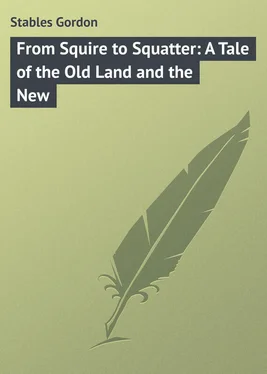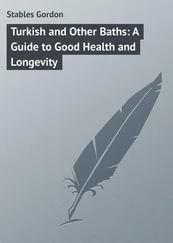Gordon Stables - From Squire to Squatter - A Tale of the Old Land and the New
Здесь есть возможность читать онлайн «Gordon Stables - From Squire to Squatter - A Tale of the Old Land and the New» — ознакомительный отрывок электронной книги совершенно бесплатно, а после прочтения отрывка купить полную версию. В некоторых случаях можно слушать аудио, скачать через торрент в формате fb2 и присутствует краткое содержание. Жанр: foreign_prose, foreign_children, на английском языке. Описание произведения, (предисловие) а так же отзывы посетителей доступны на портале библиотеки ЛибКат.
- Название:From Squire to Squatter: A Tale of the Old Land and the New
- Автор:
- Жанр:
- Год:неизвестен
- ISBN:нет данных
- Рейтинг книги:4 / 5. Голосов: 1
-
Избранное:Добавить в избранное
- Отзывы:
-
Ваша оценка:
- 80
- 1
- 2
- 3
- 4
- 5
From Squire to Squatter: A Tale of the Old Land and the New: краткое содержание, описание и аннотация
Предлагаем к чтению аннотацию, описание, краткое содержание или предисловие (зависит от того, что написал сам автор книги «From Squire to Squatter: A Tale of the Old Land and the New»). Если вы не нашли необходимую информацию о книге — напишите в комментариях, мы постараемся отыскать её.
From Squire to Squatter: A Tale of the Old Land and the New — читать онлайн ознакомительный отрывок
Ниже представлен текст книги, разбитый по страницам. Система сохранения места последней прочитанной страницы, позволяет с удобством читать онлайн бесплатно книгу «From Squire to Squatter: A Tale of the Old Land and the New», без необходимости каждый раз заново искать на чём Вы остановились. Поставьте закладку, и сможете в любой момент перейти на страницу, на которой закончили чтение.
Интервал:
Закладка:
“But how could ye hae the heart to scare an old wife sae, Master Archie?”
“Oh, granny, we got up the fun just to show you there were no such things as ghosts. Rupert says – and he should know, because he’s always reading – that ghosts are always rats or something.”
“Ye maunna frichten me again, laddie. Will ye promise?”
“Yes, granny, there’s my hand on it. Now sit down and have another cup of tea, and Elsie will play and sing.”
Elsie could sing now, and sweet young voice she had, that seemed to carry you to happier lands. Branson always said it made him feel a boy again, wandering through the woods in summer, or chasing the butterflies over flowery beds.
And so, albeit Archie had carried his practical joke out to his own satisfaction, if not to that of every one else, this evening, like many others that had come before it, and came after it, passed away pleasantly enough.
It was in the spring of the same year, and during the Easter holidays, that a little London boy came down to reside with his aunt, who lived in one of Archie’s father’s cottages.
Young Harry Brown had been sent to the country for the express purpose of enjoying himself, and set about this business forthwith. He made up to Archie; in fact, he took so many liberties, and talked to him so glibly, and with so little respect, that, although Archie had imbued much of his father’s principles as regards liberalism, he did not half like it.
Perhaps, after all, it was only the boy’s manner, for he had never been to the country at all before, and looked upon every one – Archie included – who did not know London, as jolly green. But Archie did not appreciate it, and, like the traditional worm, he turned, and once again his love for practical joking got the better of his common-sense.
“Teach us somefink,” said Harry one day, turning his white face up. He was older, perhaps, than Archie, but decidedly smaller. “Teach us somefink, and when you comes to Vitechapel to wisit me, I’ll teach you summut. My eye, won’t yer stare!”
The idea of this white-chafted, unwholesome-looking cad, expecting that he , Squire Broadbent’s son, would visit him in Whitechapel! But Archie managed to swallow his wrath and pocket his pride for the time being.
“What shall I teach you, eh? I suppose you know that potatoes don’t grow on trees, nor geese upon gooseberry-bushes?”
“Yes; I know that taters is dug out of the hearth. I’m pretty fly for a young un.”
“Can you ride?”
“No.”
“Well, meet me here to-morrow at the same time, and I’ll bring my ‘Duck.’”
“Look ’ere, Johnnie Raw, ye said ‘ ride ,’ not ‘ swim .’ A duck teaches swimmin’, not ridin’. None o’ yer larks now!”
Next day Archie swept down upon the Cockney in fine form, meaning to impress him.
The Cockney was not much impressed; I fear he was not very impressionable.
“My heye, Johnnie Raw,” he roared, “vere did yer steal the moke?”
“Look you here, young Whitechapel, you’ll have to guard that tongue of yours a little, else communications will be cut. Do you see?”
“It is a donkey, ain’t it, Johnnie?”
“Come on to the field and have a ride.”
Five minutes afterwards the young Cockney on the “Eider Duck’s” back was tearing along the field at railway speed. John Gilpin’s ride was nothing to it, nor Tam O’Shanter’s on his grey mare, Meg! Both these worthies had stuck to the saddle, but this horseman rode upon the neck of the steed. Scallowa stopped short at the gate, but the boy flew over.
Archie found his friend rubbing himself, and looking very serious, and he felt happier now.
“Call that ’ere donkey a heider duck? H’m? I allers thought heider ducks was soft!
“One to you, Johnnie. I don’t want to ride hany more.”
“What else shall I teach you?”
“Hey?”
“Come, I’ll show you over the farm.”
“Honour bright? No larks!”
“Yes; no larks!”
“Say honour.”
“Honour.”
Young Whitechapel had not very much faith in his guide, however; but he saw more country wonders that day than ever he could have dreamt of; while his strange remarks kept Archie continually laughing.
Next day the two boys went bird-nesting, and really Archie was very mischievous. He showed him a hoody-crow’s nest, which he represented as a green plover’s or lapwing’s; and a blackbird’s nest in a furze-bush, which he told Harry was a magpie’s; and so on, and so forth, till at last he got tired of the cheeky Cockney, and sent him off on a mile walk to a cairn of stones, on which he told him crows sometimes sat and “might have a nest.”
Then Archie threw himself on the moss, took out a book, and began to read. He was just beginning to repent of his conduct to Harry Brown, and meant to go up to him like a man when he returned, and crave his forgiveness.
But somehow, when Harry came back he had so long a face, that wicked Archie burst out laughing, and forgot all about his good resolve.
“What shall I teach you next?” said Archie.
“Draw it mild, Johnnie; it’s ’Arry’s turn. It’s the boy’s turn to teach you summut. Shall we ’ave it hout now wi’ the raw uns? Bunches o’ fives I means. Hey?”
“I really don’t understand you.”
“Ha! ha! ha! I knowed yer was a green ’un, Johnnie. Can yer fight? Hey? ’Cause I’m spoilin’ for a row.”
And Harry Brown threw off his jacket, and began to dance about in terribly knowing attitudes.
“You had better put on your clothes again,” said Archie. “Fight you ? Why I could fling you over the fishpond.”
“Ah! I dessay; but flingin’ ain’t fightin’, Johnnie. Come, there’s no getting hout of it. It ain’t the first young haristocrat I’ve frightened; an’ now you’re afraid.”
That was enough for Archie. And the next moment the lads were at it.
But Archie had met his match; he went down a dozen times. He remained down the last time.
“It is wonderful,” he said. “I quite admire you. But I’ve had enough; I’m beaten.”
“Spoken like a plucked ’un. Haven’t swallowed yer teeth, hey?”
“No; but I’ll have a horrid black-eye.”
“Raw beef, my boy; raw beef.”
“Well; I confess I’ve caught a tartar.”
“An’ I caught a crab yesterday. Wot about your eider duck? My heye! Johnnie, I ain’t been able to sit down conweniently since. I say, Johnnie?”
“Well.”
“Friends, hey?”
“All right.”
Then the two shook hands, and young Whitechapel said if Archie would buy two pairs of gloves he would show him how it was done. So Archie did, and became an apt pupil in the noble art of self-defence; which may be used at times, but never abused.
However, Archie Broadbent never forgot that lesson in the wood.
Chapter Six
“Johnnie’s got the Grit in him.”
On the day of his fight with young Harry in the wood, Archie returned home to find both his father and Mr Walton in the drawing-room alone. His father caught the lad by the arm. “Been tumbling again off that pony of yours?”
“No, father, worse. I’m sure I’ve done wrong.” He then told them all about the practical joking, and the finale .
“Well,” said the Squire, “there is only one verdict. What do you say, Walton?”
“Serve him right!”
“Oh, I know that,” said Archie; “but isn’t it lowering our name to keep such company?”
“It isn’t raising our name, nor growing fresh laurels either, for you to play practical jokes on this poor London lad. But as to being in his company, Archie, you may have to be in worse yet. But listen! I want my son to behave as a gentleman, even in low company. Remember that boy, and despise no one, whatever be his rank in life. Now, go and beg your mother’s and sister’s forgiveness for having to appear before them with a black-eye.”
Читать дальшеИнтервал:
Закладка:
Похожие книги на «From Squire to Squatter: A Tale of the Old Land and the New»
Представляем Вашему вниманию похожие книги на «From Squire to Squatter: A Tale of the Old Land and the New» списком для выбора. Мы отобрали схожую по названию и смыслу литературу в надежде предоставить читателям больше вариантов отыскать новые, интересные, ещё непрочитанные произведения.
Обсуждение, отзывы о книге «From Squire to Squatter: A Tale of the Old Land and the New» и просто собственные мнения читателей. Оставьте ваши комментарии, напишите, что Вы думаете о произведении, его смысле или главных героях. Укажите что конкретно понравилось, а что нет, и почему Вы так считаете.












